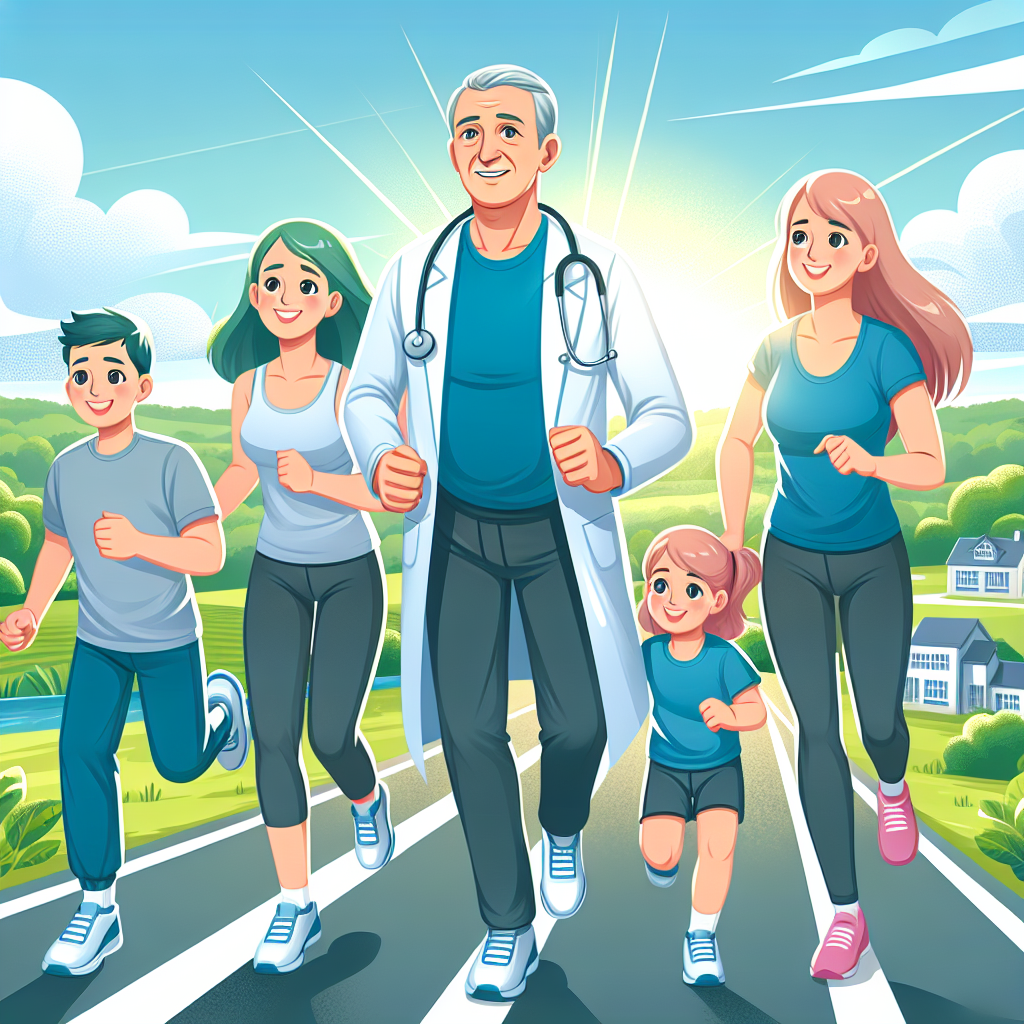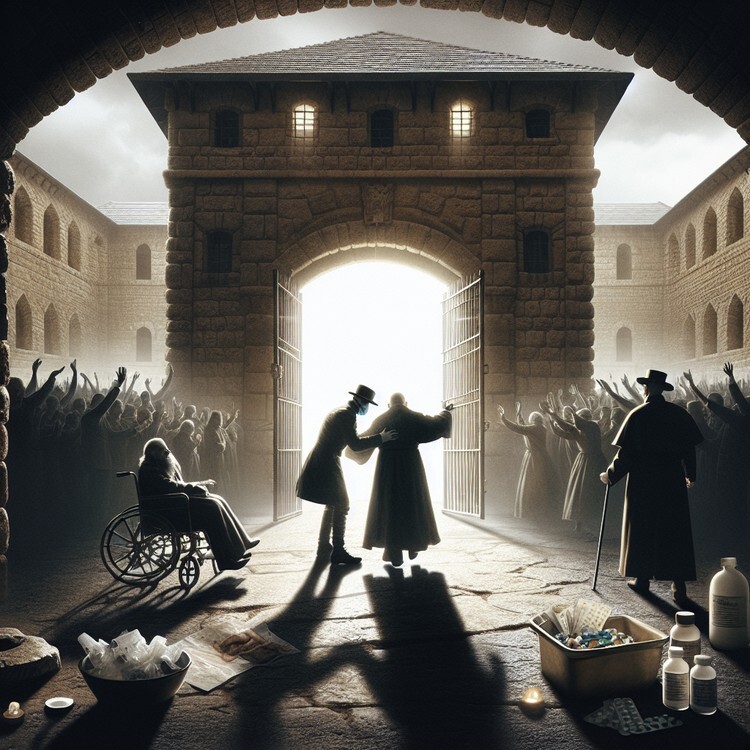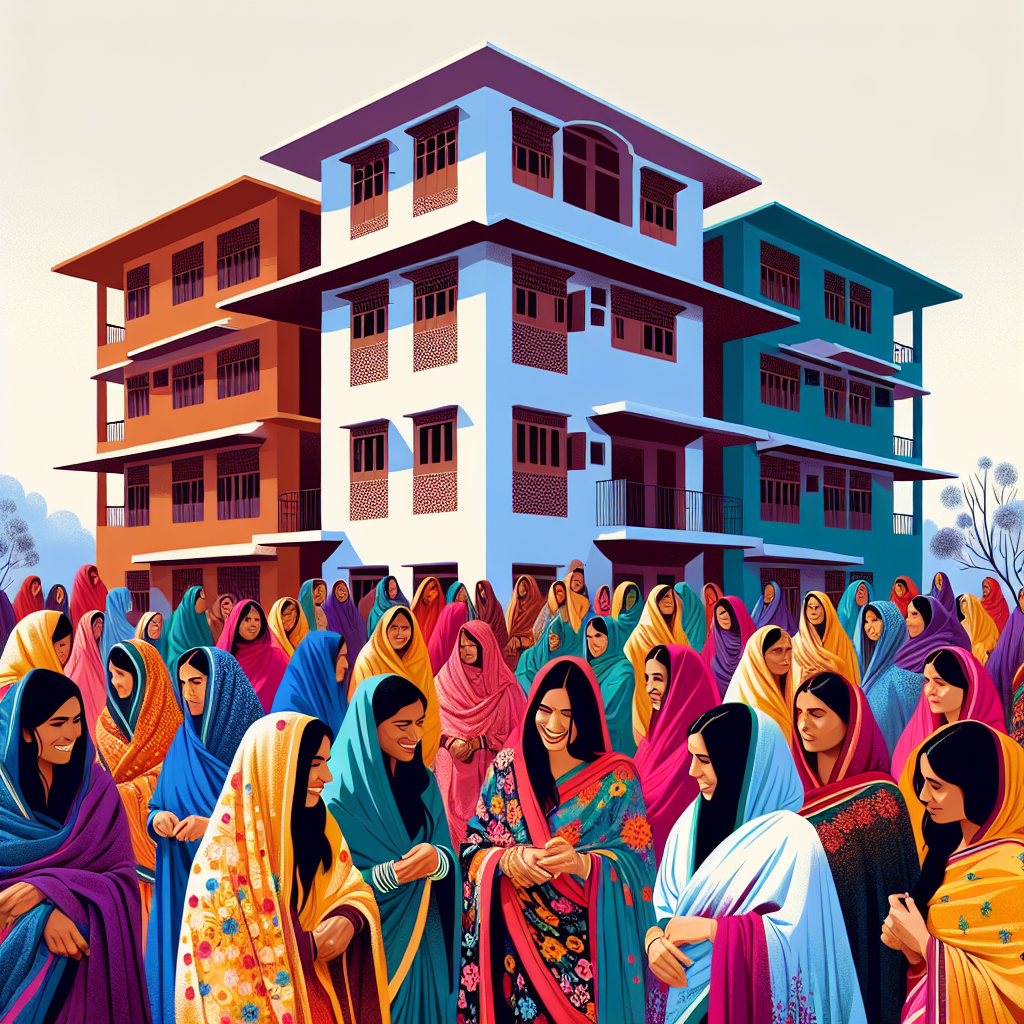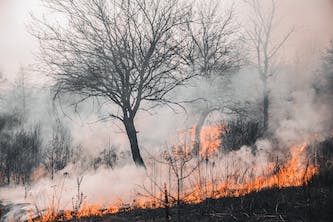Australian doctor Richard Scolyer, who is famous for his research on melanoma, is now cancer-free after a year of receiving a special treatment for glioblastoma, a type of brain cancer. Glioblastoma is a very aggressive cancer with a low survival rate. Scolyer’s latest MRI scan showed that the tumor has not come back. Scolyer and his colleague Georgina Long were named Australian of the Year for their amazing work on melanoma. They have made a big difference in the lives of people with advanced melanoma, with half of them now being essentially cured. Scolyer is now trying the same treatment in the hope of finding a cure for his brain cancer.
The treatment involves giving Scolyer a combination of drugs before surgery to remove the tumor. He is also the first patient to get a personalized vaccine that helps the drugs find the cancer cells. Scolyer had some problems during the first few months of treatment, like seizures and other health issues, but now he is feeling better and is exercising every day. He knows that his brain cancer is not cured, but he is grateful for the extra time he has to spend with his family and enjoy life.
The results of Scolyer’s treatment have made doctors very excited because it could help the thousands of people who are diagnosed with brain cancer every year. Scolyer and Long hope that their experimental treatment will make Scolyer live longer and eventually be tested on other people with glioblastoma. But they want to make it clear that they still have a long way to go before they can say that this treatment is safe and approved. They are waiting for a scientific paper to be reviewed that will explain the first results of Scolyer’s treatment.
Scolyer’s chances of getting better were not good at first, but the early results have been promising. However, doctors say that they need more time to see if the treatment really works in the long term. Scolyer is proud of the information his treatment has given to doctors and is thankful to his family and medical team for supporting him in trying this new approach. He believes that this direction is worth exploring more and gives hope to future patients.
Original news source: Top doctor cancer-free a year after world-first therapy (BBC)
🎧 Listen:
Slow
Normal
Fast
📖 Vocabulary:
| 1 | melanoma | A type of skin cancer |
| 2 | glioblastoma | A type of brain cancer |
| 3 | aggressive | Very forceful and intense |
| 4 | survival | Continuing to live or exist |
| 5 | personalized | Made specifically for one person |
| 6 | vaccine | A substance that helps protect against disease |
| 7 | seizures | Sudden, uncontrolled electrical activity in the brain |
| 8 | experimental | Trying out new ideas or methods |
| 9 | diagnosed | Identified a disease or condition by its signs and symptoms |
| 10 | approved | Officially accepted or allowed |
| 11 | promising | Showing signs of future success |
| 12 | approach | A way of dealing with something |
| 13 | advanced | At a high level or stage |
| 14 | essentially | Basically or nearly |
| 15 | grateful | Feeling thankful and appreciative |
Group or Classroom Activities
Warm-up Activities:
– News Summary
Instructions:
1. Divide the class into pairs or small groups.
2. Give each group a copy of the article.
3. Instruct the groups to read the article together and then write a brief summary of the main points.
4. After a designated amount of time, have each group share their summary with the class.
– Opinion Poll
Instructions:
1. Write the following question on the board: “Do you think personalized vaccines will be a successful treatment for brain cancer in the future?”
2. Divide the class into pairs or small groups.
3. Instruct the groups to discuss the question and come up with their own opinions.
4. Once they have discussed, have each group share their opinions with the class and explain their reasoning.
– Vocabulary Pictionary
Instructions:
1. Write key vocabulary words from the article on separate slips of paper and put them in a hat.
2. Divide the class into two teams.
3. One student from each team will come to the front of the class and draw a slip of paper from the hat.
4. The student must then draw a picture to represent the word without using any letters or numbers.
5. The team members must try to guess the word based on the drawing.
6. If the team guesses correctly within a certain time limit, they earn a point.
7. Repeat with new students from each team until all the vocabulary words have been used.
– Pros and Cons
Instructions:
1. Divide the class into pairs or small groups.
2. Instruct each group to create a pros and cons list for the experimental treatment discussed in the article.
3. After a designated amount of time, have each group share their lists with the class.
4. Facilitate a class discussion about the pros and cons of the treatment, encouraging students to express their opinions and provide evidence to support their views.
– Future Predictions
Instructions:
1. Instruct each student to write three predictions about the future of cancer treatment based on the information in the article.
2. After a designated amount of time, have students share their predictions with a partner.
3. Encourage students to discuss their predictions and provide reasons for their choices.
4. As a class, have a discussion about the different predictions and the likelihood of each one coming true.
🤔 Comprehension Questions:
1. Who is Richard Scolyer and why is he famous?
2. What type of cancer did Richard Scolyer have?
3. What did Richard Scolyer’s latest MRI scan show?
4. What is the treatment that Richard Scolyer received for his brain cancer?
5. What problems did Richard Scolyer experience during the first few months of treatment?
6. How does Richard Scolyer feel now and what is he grateful for?
7. Why are doctors excited about the results of Richard Scolyer’s treatment?
8. What do Richard Scolyer and Georgina Long hope to achieve with their experimental treatment?
Go to answers ⇩
🎧✍️ Listen and Fill in the Gaps:
(1)______ doctor (2)______ (3)______, who is famous for his research on melanoma, is now (4)______-free after a year of receiving a special treatment for glioblastoma, a type of brain cancer. Glioblastoma is a very aggressive cancer with a low survival rate. Scolyer’s latest MRI scan showed that the tumor has not come back. Scolyer and his colleague Georgina Long were named Australian of the Year for their amazing work on melanoma. They have made a big difference in the lives of people with advanced melanoma, with half of them now being essentially cured. Scolyer is now trying the same (5)______ in the hope of finding a cure for his brain cancer.
The treatment involves giving Scolyer a combination of drugs before surgery to remove the tumor. He is also the first (6)______ to get a personalized vaccine that helps the drugs find the cancer cells. Scolyer had some (7)______ during the first few months of treatment, like seizures and other health (8)______, but now he is feeling better and is exercising every day. He knows that his brain cancer is not cured, but he is grateful for the (9)______ time he has to spend with his family and (10)______ life.
The results of Scolyer’s treatment have made doctors very excited because it could help the thousands of people who are diagnosed with brain cancer every year. Scolyer and Long hope that their (11)______ treatment will make Scolyer live longer and eventually be (12)______ on other people with glioblastoma. But they want to make it clear that they still have a long way to go before they can say that this treatment is safe and approved. They are waiting for a scientific paper to be reviewed that will explain the first results of Scolyer’s treatment.
Scolyer’s chances of getting better were not good at first, but the early results have been promising. However, doctors say that they need more time to see if the treatment really works in the long term. Scolyer is proud of the information his treatment has (13)______ to doctors and is thankful to his (14)______ and (15)______ team for supporting him in (16)______ this new approach. He believes that this direction is worth exploring more and gives hope to future patients.
Go to answers ⇩
💬 Discussion Questions:
Students can ask a partner these questions, or discuss them as a group.
1. How would you feel if you were diagnosed with a very aggressive type of cancer?
2. Do you think it’s important for doctors to continue researching and finding new treatments for cancer? Why or why not?
3. What is a personalized vaccine? How do you think it could help in treating cancer?
4. How do you think Richard Scolyer’s family feels now that he is cancer-free?
5. Do you like the idea of using drugs and vaccines together to treat cancer? Why or why not?
6. What is glioblastoma? Have you ever heard of this type of cancer before?
7. How do you think Richard Scolyer’s life has changed since being diagnosed with brain cancer?
8. What do you think it means to be named “Australian of the Year”?
9. How would you feel if you were in Richard Scolyer’s position, knowing that your cancer is not cured but you have more time to enjoy life?
10. Do you think it’s fair that Richard Scolyer had to experience health issues during the first few months of treatment? Why or why not?
11. How do you think Richard Scolyer’s research on melanoma has made a big difference in the lives of people with advanced melanoma?
12. What do you think it means for a treatment to be “safe and approved”?
13. How do you think Richard Scolyer’s treatment could give hope to future patients with glioblastoma?
14. How do you think Richard Scolyer’s experience has affected his perspective on life?
15. Do you think it’s important for doctors to continue exploring new approaches in cancer treatment? Why or why not?
Individual Activities
📖💭 Vocabulary Meanings:
Match each word to its meaning.
Words:
1. melanoma
2. glioblastoma
3. aggressive
4. survival
5. personalized
6. vaccine
7. seizures
8. experimental
9. diagnosed
10. approved
11. promising
12. approach
13. advanced
14. essentially
15. grateful
Meanings:
(A) Basically or nearly
(B) Feeling thankful and appreciative
(C) Made specifically for one person
(D) A type of skin cancer
(E) A substance that helps protect against disease
(F) Continuing to live or exist
(G) Sudden, uncontrolled electrical activity in the brain
(H) Trying out new ideas or methods
(I) A way of dealing with something
(J) Very forceful and intense
(K) A type of brain cancer
(L) At a high level or stage
(M) Showing signs of future success
(N) Identified a disease or condition by its signs and symptoms
(O) Officially accepted or allowed
Go to answers ⇩
🔡 Multiple Choice Questions:
1. What type of cancer did Richard Scolyer have?
(a) Melanoma
(b) Lung cancer
(c) Glioblastoma
(d) Breast cancer
2. What is the survival rate of glioblastoma?
(a) High
(b) Moderate
(c) Unknown
(d) Low
3. What award were Richard Scolyer and Georgina Long given?
(a) Nobel Prize
(b) Australian of the Year
(c) Pulitzer Prize
(d) Grammy Award
4. What is the main goal of Richard Scolyer’s treatment?
(a) To find a cure for his brain cancer
(b) To remove the tumor through surgery
(c) To improve his overall health
(d) To prevent the tumor from coming back
5. What problems did Richard Scolyer experience during the first few months of treatment?
(a) Fatigue and nausea
(b) Headaches and dizziness
(c) None, he had no side effects
(d) Seizures and other health issues
6. What are doctors excited about regarding Richard Scolyer’s treatment?
(a) It has been approved as a safe treatment
(b) It has been proven to cure glioblastoma
(c) It could help thousands of people with brain cancer
(d) It can be tested on other types of cancer
7. What do Richard Scolyer and Georgina Long want to make clear about their treatment?
(a) It is only effective for melanoma
(b) It is still in the experimental stage
(c) It has already been approved by the FDA
(d) It is not suitable for all types of cancer
8. What does Richard Scolyer believe about the future of his treatment?
(a) It is worth exploring further and gives hope to future patients
(b) It will never be approved for widespread use
(c) It is too risky to be considered a viable option
(d) It will only benefit a small number of patients
Go to answers ⇩
🕵️ True or False Questions:
1. The treatment does not involve a combination of drugs administered before surgery to remove the tumor, as well as a personalized vaccine to target the cancer cells.
2. Half of the people with advanced melanoma have not been essentially cured through Scolyer and Long’s work.
3. Scolyer’s recent MRI scan showed no signs of the tumor returning.
4. Scolyer and his colleague Georgina Long were honored as Australian of the Year for their significant contributions to melanoma research.
5. Scolyer is now undergoing the same treatment in hopes of finding a cure for his brain cancer.
6. Glioblastoma is a highly aggressive cancer with a high survival rate.
7. While Scolyer’s brain cancer is not yet cured, he is disappointed by the extra time he has not gained to spend with his family and enjoy life.
8. Australian doctor Richard Scolyer, known for his research on melanoma, has successfully received a special treatment for glioblastoma, a type of brain cancer.
Go to answers ⇩
📝 Write a Summary:
Write a summary of this news article in two sentences.
Check your writing now with the best free AI for English writing!
Writing Questions:
Answer the following questions. Write as much as you can for each answer.
Check your answers with our free English writing assistant!
1. Who is Richard Scolyer and why is he famous?
2. What type of cancer did Richard Scolyer have and what is its survival rate?
3. What is the treatment that Richard Scolyer received for his brain cancer?
4. What were some of the problems Richard Scolyer faced during the first few months of treatment?
5. How have the results of Richard Scolyer’s treatment affected doctors and what are their hopes for the future?
✅ Answers
🤔✅ Comprehension Question Answers:
1. Who is Richard Scolyer and why is he famous?
Richard Scolyer is an Australian doctor who is famous for his research on melanoma, a type of skin cancer.
2. What type of cancer did Richard Scolyer have?
Richard Scolyer had glioblastoma, which is a type of brain cancer.
3. What did Richard Scolyer’s latest MRI scan show?
Richard Scolyer’s latest MRI scan showed that the tumor in his brain had not come back.
4. What is the treatment that Richard Scolyer received for his brain cancer?
Richard Scolyer received a combination of drugs before surgery to remove the tumor, as well as a personalized vaccine to help the drugs find the cancer cells.
5. What problems did Richard Scolyer experience during the first few months of treatment?
Richard Scolyer experienced seizures and other health issues during the first few months of treatment.
6. How does Richard Scolyer feel now and what is he grateful for?
Richard Scolyer is feeling better now and is grateful for the extra time he has to spend with his family and enjoy life.
7. Why are doctors excited about the results of Richard Scolyer’s treatment?
Doctors are excited about the results of Richard Scolyer’s treatment because it could potentially help thousands of people who are diagnosed with brain cancer every year.
8. What do Richard Scolyer and Georgina Long hope to achieve with their experimental treatment?
Richard Scolyer and Georgina Long hope that their experimental treatment will help Richard live longer and eventually be tested on other people with glioblastoma. They want to find a safe and approved treatment for this type of cancer.
Go back to questions ⇧
🎧✍️✅ Listen and Fill in the Gaps Answers:
(1) Australian
(2) Richard
(3) Scolyer
(4) cancer
(5) treatment
(6) patient
(7) problems
(8) issues
(9) extra
(10) enjoy
(11) experimental
(12) tested
(13) given
(14) family
(15) medical
(16) trying
Go back to questions ⇧
📖💭✅ Vocabulary Meanings Answers:
1. melanoma
Answer: (D) A type of skin cancer
2. glioblastoma
Answer: (K) A type of brain cancer
3. aggressive
Answer: (J) Very forceful and intense
4. survival
Answer: (F) Continuing to live or exist
5. personalized
Answer: (C) Made specifically for one person
6. vaccine
Answer: (E) A substance that helps protect against disease
7. seizures
Answer: (G) Sudden, uncontrolled electrical activity in the brain
8. experimental
Answer: (H) Trying out new ideas or methods
9. diagnosed
Answer: (N) Identified a disease or condition by its signs and symptoms
10. approved
Answer: (O) Officially accepted or allowed
11. promising
Answer: (M) Showing signs of future success
12. approach
Answer: (I) A way of dealing with something
13. advanced
Answer: (L) At a high level or stage
14. essentially
Answer: (A) Basically or nearly
15. grateful
Answer: (B) Feeling thankful and appreciative
Go back to questions ⇧
🔡✅ Multiple Choice Answers:
1. What type of cancer did Richard Scolyer have?
Answer: (c) Glioblastoma
2. What is the survival rate of glioblastoma?
Answer: (d) Low
3. What award were Richard Scolyer and Georgina Long given?
Answer: (b) Australian of the Year
4. What is the main goal of Richard Scolyer’s treatment?
Answer: (a) To find a cure for his brain cancer
5. What problems did Richard Scolyer experience during the first few months of treatment?
Answer: (d) Seizures and other health issues
6. What are doctors excited about regarding Richard Scolyer’s treatment?
Answer: (c) It could help thousands of people with brain cancer
7. What do Richard Scolyer and Georgina Long want to make clear about their treatment?
Answer: (b) It is still in the experimental stage
8. What does Richard Scolyer believe about the future of his treatment?
Answer: (a) It is worth exploring further and gives hope to future patients
Go back to questions ⇧
🕵️✅ True or False Answers:
1. The treatment does not involve a combination of drugs administered before surgery to remove the tumor, as well as a personalized vaccine to target the cancer cells. (Answer: False)
2. Half of the people with advanced melanoma have not been essentially cured through Scolyer and Long’s work. (Answer: False)
3. Scolyer’s recent MRI scan showed no signs of the tumor returning. (Answer: True)
4. Scolyer and his colleague Georgina Long were honored as Australian of the Year for their significant contributions to melanoma research. (Answer: True)
5. Scolyer is now undergoing the same treatment in hopes of finding a cure for his brain cancer. (Answer: True)
6. Glioblastoma is a highly aggressive cancer with a high survival rate. (Answer: False)
7. While Scolyer’s brain cancer is not yet cured, he is disappointed by the extra time he has not gained to spend with his family and enjoy life. (Answer: False)
8. Australian doctor Richard Scolyer, known for his research on melanoma, has successfully received a special treatment for glioblastoma, a type of brain cancer. (Answer: True)
Go back to questions ⇧















